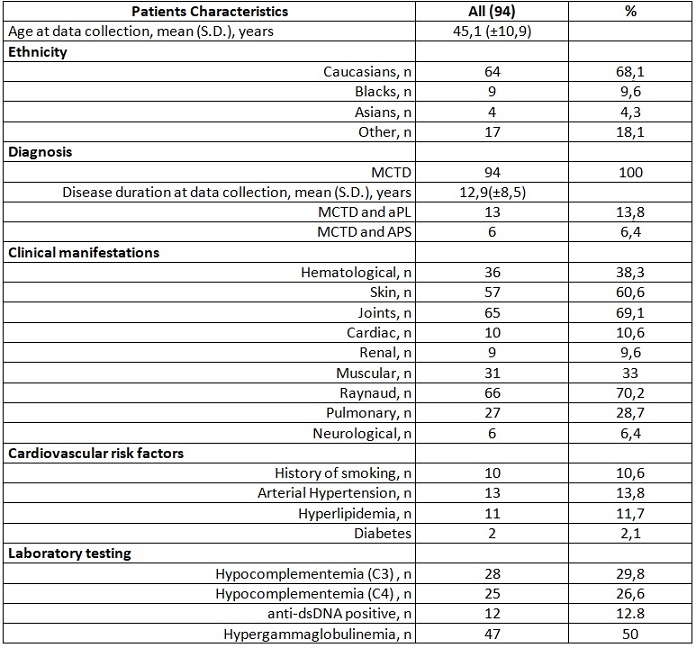Session Information
Session Type: ACR Poster Session C
Session Time: 9:00AM-11:00AM
Background/Purpose:
Mixed connective tissue disease (MCTD) is characterized by signs and symptoms of a combination of disorders, primarily systemic lupus erythematosus (SLE), scleroderma and polymyositis and is characterized by the presence of high titre antibodies to U1-ribonucleoprotein (RNP).
When planning a pregnancy in patients with connective tissue diseases, ENA profiling is suggested but generally refers to testing for maternal antibodies specifically to components of the SSA/Ro-SSB/La ribonucloprotein complex since these have been associated with foetal cardiac conduction abnormalities and neonatal skin rashes. Nevertheless, little is known about the maternal and foetal pregnancy outcomes in women with the presence of anti-U1RNP antibodies absent reactivity to SSA/Ro-SSB/La.
Methods:
Data was retrospectively collected from S. Giovanni Bosco Hospital and Sant’ Anna University Hospital, Turin, Italy, the Lupus Unit, Department of Rheumatology at St Thomas’ Hospital, London, UK, Hospital das Clínicas da Faculdade de Medicina da Universidade de Sao Paulo, Sao Paulo, Brazil, Hospital Reina Sofia de Córdoba, Spain, ASST SpedaliCivili di Brescia, Brescia, Italy.
Inclusion criteria included: Women ever pregnant who fulfilled the established criteria of MCTD with confirmed anti-U1RNP positivity.
Results:
This multicentre retrospective cohort study describes the foetal and maternal outcomes of 203 pregnancies in 94 consecutive women ever pregnant (mean age at data collection 45.1 years old, S.D. 10.9; mean disease duration at data collection 12.9 years, S.D. 8.5). Demographic, clinical and laboratory characteristics are summarized in Figure 1. Of the 203 pregnancies analysed the foetal outcomes were as follows: 146 (71,9%) resulted in live births, 38 (18,7%) in miscarriages, 18 (8,9%) in stillbirths (after 20 weeks gestation) and eleven (5,4%) cases showed intrauterine growth restriction (IUGR). Maternal pregnancy outcomes were as follows: eight (3,9%) cases developed pre-eclampsia, two (0,9%) cases developed eclampsia, 31 (15,3%) women developed gestational hypertension and three (1,5%) cases were diagnosed with gestational diabetes. Moreover, we report a case of complete congenital heart block (0,45%) and a case of skin rash in consecutive offspring born to a mother with anti U1RNP antibodies in the absence of anti-Ro/SSA-SSB/La antibodies.
Conclusion:
The observed live-birth-rate was as high as 72%, with poorer foetal outcomes observed in MCTD women with antiphospholipid antibodies and pulmonary or muscular involvement. While the true frequency of heart block associated with anti-U1RNP remains to be determined, this study raises the consideration of echocardiographic surveillance in this setting. Women with MCTD should receive a specific counselling when planning a pregnancy, as it is currently done in women with SLE.
To cite this abstract in AMA style:
Radin M, Schreiber K, Cuadrado MJ, Cecchi I, Andreoli L, Franceschini F, Caleiro MT, Andrade D, Gibbone E, Khamashta MA, Buyon JP, Izmirly PM, Aguirre M, Benedetto C, Roccatello D, Marozio L, Sciascia S. Pregnancy Outcomes in Mixed Connective Tissue Disease: Results from a Multicentre Cohort Study [abstract]. Arthritis Rheumatol. 2018; 70 (suppl 9). https://acrabstracts.org/abstract/pregnancy-outcomes-in-mixed-connective-tissue-disease-results-from-a-multicentre-cohort-study/. Accessed .« Back to 2018 ACR/ARHP Annual Meeting
ACR Meeting Abstracts - https://acrabstracts.org/abstract/pregnancy-outcomes-in-mixed-connective-tissue-disease-results-from-a-multicentre-cohort-study/

